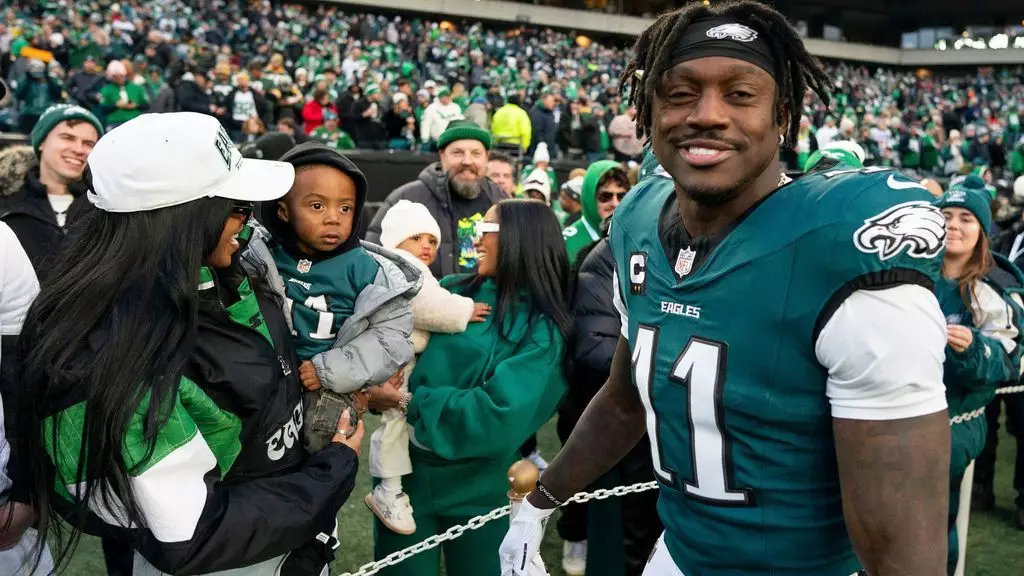In the high-stakes world of professional football, every moment is scrutinized, and every action can lead to discussions that transcend the game itself. A.J. Brown, the star wide receiver for the Philadelphia Eagles, drew attention during their recent playoff victory against the Green Bay Packers not for his on-field stats but for a rather unconventional behavior: reading a book on the sidelines. As cameras captured the moment, questions swirled—what was he reading, and more importantly, why was he doing so in the midst of a crucial playoff game?
The book in Brown’s hands was none other than “Inner Excellence” by Jim Murphy, a text aimed at enhancing mental performance and life quality. While many might expect players to be solely focused on the game, Brown’s inclusion of literature in his sideline routine speaks volumes about his psychological strategy. He clarified that he wasn’t merely occupying time due to lackluster performance—only managing one catch for a mere ten yards during the game—but was actively engaging in a practice that brought him calm and focus.
“I bring it to every game,” Brown shared, emphasizing that this was not a spur-of-the-moment decision but a constant part of his pre-game and in-game regimen. Highlighted passages serve as reminders to maintain composure regardless of the game’s circumstances, illustrating an example of an athlete consciously engaging in self-improvement even while competing at the professional level.
Debunking the Frustration Narrative
While post-game analyses are notorious for reading into players‘ on-field demeanor—often fabricating drama from simple observations—Brown pushed back against the narrative suggesting he was frustrated. His reaction to public assumptions about his mental state demonstrates a critical aspect of professional athletics: the constant balancing act between public perception and personal interpretation of performance. His pointed remarks on social media, where he commented on the nature of controversy and the quest for truth, highlight a growing necessity for athletes to reclaim their narratives.
“I use it to refocus and lock in despite what may transpire in the game, good or bad,” he explained, hinting at a broader trend of integrating mental health strategies into athletic performance. In a world where athletes are often viewed as mere entertainers, Brown’s approach stands out, advocating for mental fortitude and tactical mindfulness—even in the most stressful of situations.
Adding another layer to his sideline philosophy was Brown’s acknowledgment of managing physical injuries leading up to the game. Having faced a knee issue that limited his practice availability earlier in the week, he entered the playoff matchup “banged up,” a reality many athletes face as the season progresses. Yet, despite the turmoil of injuries, he expressed optimism post-game, underscoring a mindset that transcends mere physicality. “I definitely feel like I’m turning the corner. I came out of the game healthy,” he declared, again showcasing a balance between mental and physical well-being.
This perspective resonates even more profoundly as the Eagles prepare for the next round of playoffs. With their quarterback Jalen Hurts missing critical weeks due to concussion protocols and both Brown and fellow receiver DeVonta Smith dealing with physical discomfort, the passing game had its challenges. Brown’s insights into team dynamics, particular commentator analysis on Hurts’ performance, underscore the broader points of resilience and adaptability that are vital for success in playoff football.
Ultimately, A.J. Brown’s unconventional approach to sideline behavior is more than just an individual quirk; it represents a broader acceptance of alternative strategies within team sports. As noted by Hurts, “Everybody has a different thing and finds their flow in different ways.” This statement illuminates the diversity of mental practices athletes may employ to hone focus and drive performance, bridging the gap between individual strengths and collective success.
Brown’s sideline reading is not merely an anecdote but a reflection of how athletes are increasingly acknowledging the importance of mental resilience alongside physical prowess. As the Eagles look toward their next playoff challenge, fans and analysts alike will undoubtedly keep an eye on Brown—both for his contributions to the game and for the insights he brings from his pages of “Inner Excellence.” In doing so, he provides a new narrative for what it means to be a modern athlete in the rigorous environment of professional sports.


Napsat komentář